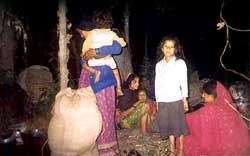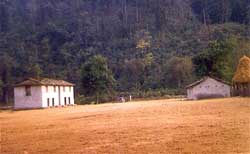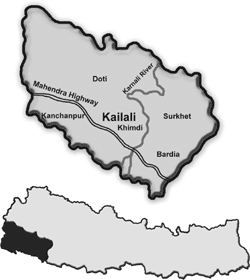 It was a good place to sink their roots: the fertile and green slopes of the Siwalik in far-western Nepal. The ancestors of the villagers of Khimdi had chosen the spot well. They lived with the rhythm of the seasons and the remoteness of the village had shielded them from the violence, so far.
It was a good place to sink their roots: the fertile and green slopes of the Siwalik in far-western Nepal. The ancestors of the villagers of Khimdi had chosen the spot well. They lived with the rhythm of the seasons and the remoteness of the village had shielded them from the violence, so far. Then, on the afternoon of 1 December, everything changed. In the end, it was Khimdi's strategic location on the tri-junction between the districts of Doti, Kailali and Surkhet that turned it into a battlezone. The pitched battle lasted 15 hours, and when it ended, 30 people were dead, including two villagers. The Maoists claim 25 army personnel died and seven of theirs, while the army puts the figure at 24 rebels and six soldiers.
Security sources say three teams of the unified command had reached Khimdi after they were tipped off that there were rebel training camps in the surrounding villages. The first unit had crossed the river and was on its way towards Doti. "The Maoists had asked us to close the school on that day, they had planned to attack the security force unit," recalls Harka Bahadur Bam, a teacher at the local school. But since the unit did not camp there, that attack was called off.
The two other security force units decided to set up camp at the Bhrikuti Secondary School at Khimdi. A Maoist force based in nearby Lisnegam knew about this through local informants, and seems to have decided to attack the camp. At 4PM, the school was about to close. Some students had left, others were on their way home when the sound of a fierce gun battle rent the air.
 As soon as they heard the shots, the remaining teachers and students took refuge in the house of Chandra Bhandari, shivering with fear. The fighting raged all night. By morning, when they came out, the villagers saw bodies everywhere. Most of the dead were Maoists, and the bodies remained rotting there for days afterwards. The school used to have 400 students, many are still lost. Parents went into the forest to look for their children and came back weeping when they couldn't find them.
As soon as they heard the shots, the remaining teachers and students took refuge in the house of Chandra Bhandari, shivering with fear. The fighting raged all night. By morning, when they came out, the villagers saw bodies everywhere. Most of the dead were Maoists, and the bodies remained rotting there for days afterwards. The school used to have 400 students, many are still lost. Parents went into the forest to look for their children and came back weeping when they couldn't find them. After the clash, locals say army reinforcements arrived. The soldiers accused the villagers of sheltering rebels and forced them to abandon their homes. With nowhere to go, women like Chandra Bhandari took their children and cattle, and have spent more than a week camping in the forest. But even living in the forest affords them little security. Villagers take the threats of aerial bombardment seriously and hide in the undergrowth.
In Kathmandu on Wedensday, army spokesman Deepak Gurung denied that the soldiers had forced the villagers out, saying many were afraid to return home because the fighting had been so fierce.
Like most villages in midwestern Nepal, Khimdi too is populated by mostly women and children. The men have all left for jobs and safety to cities or India. They send money home and that is how the families survive. One of the few men in the village is Bhim Bahadur Bali. He tell us: "The soldiers told us that if we did not leave, they would torch our houses and drop bombs from helicopters on our village." He is so afraid that he is considering leaving his village for good. But he has nowhere to go. "My wife is telling me soon there will be another clash between the army and the Maoists and we might get killed, she wants us to move away with the family."
 "I don't mind dying at this age," says Chandra Bhandari. "But, I want my children to live. I don't know where to take them, even the jungles are not safe." Bhrikuti Secondary School has been closed ever since the battle. Twelve students are still missing and the fear is so palpable that there is no point opening. Most school children now spend their days minding the cattle, always careful to remain close to the village and away from the stench of decomposing human bodies and corpses of cattle at the forests' edge.
"I don't mind dying at this age," says Chandra Bhandari. "But, I want my children to live. I don't know where to take them, even the jungles are not safe." Bhrikuti Secondary School has been closed ever since the battle. Twelve students are still missing and the fear is so palpable that there is no point opening. Most school children now spend their days minding the cattle, always careful to remain close to the village and away from the stench of decomposing human bodies and corpses of cattle at the forests' edge. The people are so terrified they don't talk to strangers. One of them finally musters the courage to tell us: "If we provide shelter to the army, the rebels will kill us the next morning. If we help the rebels, we get killed by the security forces. Instead of helping either side, we would rather jump into the Karnali and drown ourselves."
Bal Kumari Bhandari remembers when life in Khimdi was idyllic: "It used to be so peaceful, we used to take our cattle to the forests' edge and collect fodder. We used to sing all day." Today, she has no cattle to tend, they were killed in the crossfire. Newlyweds Padam and Dammara Bhandari set out on 1 December to collect fodder. No one has seen them since, although bundles of grass were found near the village.
Despite the scale of the devastation and the catastrophe that has befallen their village, there has been little help forthcoming from the government. Kailali CDO Shibendra Purush Dhakal admits that low-ranking army personnel mistreated the villagers after the Maoists attacked the camping soldiers. The villagers went to meet the CDo but despite his assurances, they've returned back to the relative safety of the forests.
As we got ready to depart Khimdi, the group of locals who had agreed to speak to us had just one question: "The two sides came here, they killed each other, drove us out, and then they left. Can anyone tell us why they did this to us?"


